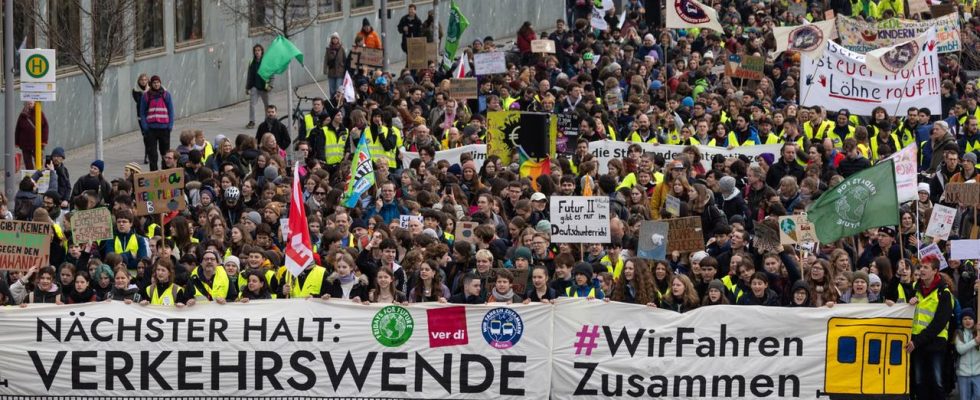For attractive local transport, more climate protection and better working conditions in public transport: “Fridays for future” supported the ver.di union in its warning strikes with a day of action. Buses and trains were canceled almost everywhere.
Buses and trains have again come to a standstill in several federal states. The ver.di union, together with the climate movement “Fridays for Future” (FFF), called for strikes. It was the second round of warning strikes in the ongoing collective bargaining dispute in local public transport, which ver.di is carrying out in parallel in almost all federal states.
Both organizations appeared together at numerous demonstrations and rallies as part of the “We ride together” alliance to demonstrate for better working conditions in public transport. But it was also about more climate protection and better public transport facilities.
Ver.di is satisfied
According to ver.di, the warning strike affected more than 100 cities in almost all federal states. Passengers had to adapt to extensive restrictions on local public transport. Only in Bavaria, Saarland and Thuringia were there no strikes. Warning strikes began yesterday in many countries. In some cases, restrictions can still be expected tomorrow.
“We are very satisfied,” said the ver.di specialist group leader for buses and trains, Andreas Schackert, to the dpa news agency in the afternoon. “We were visible and successful with our strike; with a few exceptions, the industrial action went on undisturbed everywhere.”
Schackert described the collaboration with “Fridays for Future” as a complete success. There were joint appearances and rallies all over the country. “We have traveled together in many cities and shown that it is not just a matter of a small interest group of employees fighting for their profits,” he emphasized, “but that we need attractive working conditions for reliable and attractive public transport.”
FFF: Social-ecological transport transition is possible
Liv Manthey, an activist in the climate movement, expressed a similar opinion: “It is a political question whether the people who take us from A to B every day have good working conditions,” she said. “And it is a political question whether mobility is made possible for everyone – or not.” A social-ecological transport transition is possible and helps everyone.
According to Manthey, thousands of people were drawn to the largest rally in Berlin’s Invalidenpark. Activist Luisa Neubauer and ver.di deputy federal chairwoman Christine Behle appeared there together.
Shorter working hours, more vacation days
Ver.di had called on a total of around 90,000 employees in local public transport nationwide to go on a “wave strike” since Monday. The union is currently negotiating new collective agreements with transport companies in 14 federal states.
Higher fees are only involved in the federal states of Brandenburg, Saxony-Anhalt and Thuringia. Ver.die is also campaigning for more money in Saarland, but here both sides agreed on a deal a few days ago.
In the other federal states, however, it is primarily about better working conditions for employees. In Hamburg, for example, ver.di wants to implement the 35-hour week. In Berlin, it’s all about longer turnaround times at the end of a route, more vacation days and vacation pay.
Are further strikes possible?
It is unclear whether there will be another such large-scale warning strike in public transport soon. The fronts are not seen as hardened everywhere. There are likely to be deals in more and more federal states in the next few weeks. This means that the number of cities and districts in which ver.di can call for warning strikes is decreasing.
But passengers are threatened with further cancellations elsewhere. On Thursday, the resumed collective bargaining between Deutsche Bahn and the train drivers’ union GDL was broken off prematurely. This means that new strikes are likely in long-distance, regional and rail freight transport.

